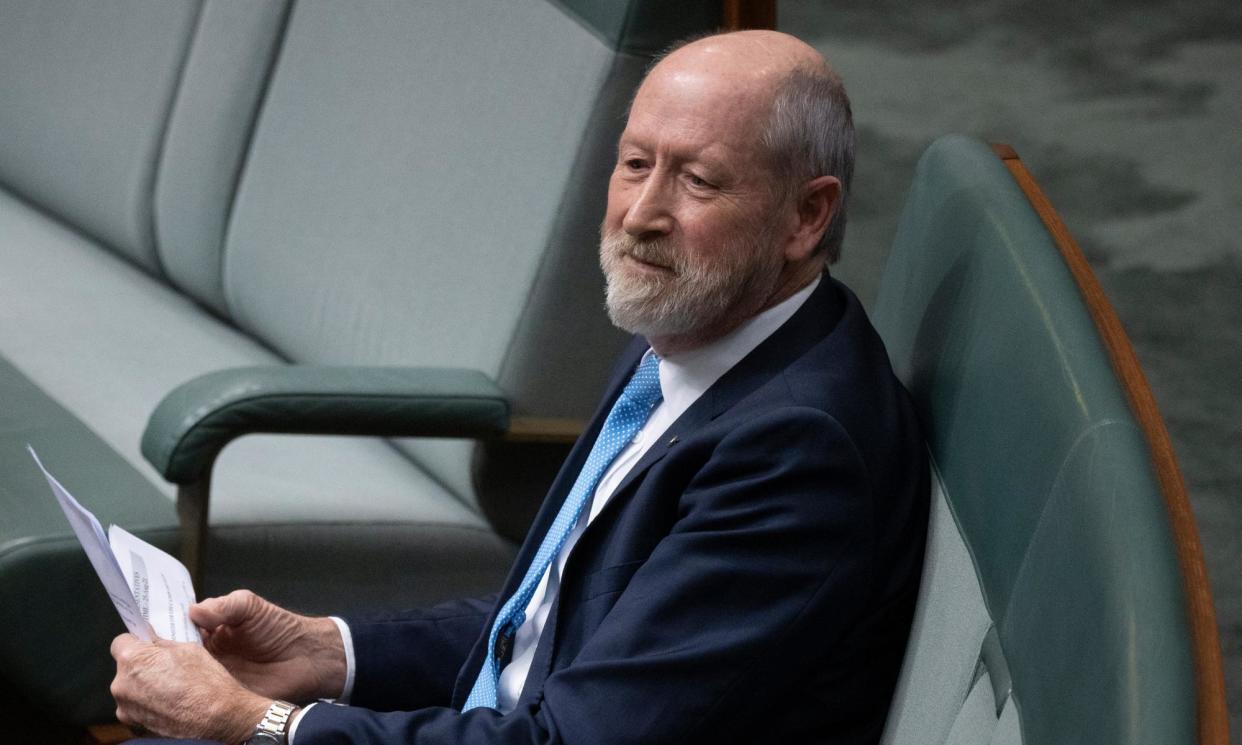Talk of nuclear power plant sites ‘conjecture’, says Liberal MP amid internal division on Dutton’s policy

The Liberal MP Rowan Ramsey has said any talk of where nuclear power plants would be built or waste would go is “conjecture” that cannot sensibly be tackled until after the nuclear ban is lifted.
As the opposition leader, Peter Dutton, prepares to announce an energy policy nominating up to six possible sites for nuclear plants, he faces internal divisions about the level of government support required, proposed locations and questions about storage of nuclear waste.
On Tuesday Dutton all but confirmed the Coalition will propose locating nuclear power plants on the site of retiring coal power plants, claiming that this would save having to build new transmission infrastructure for renewables.
The plan would suggest that the Labor-held seat of Hunter, independent Andrew Gee’s seat of Calare and Coalition-held Flynn, Maranoa, O’Connor and Gippsland are on the shortlist for nuclear power stations.
The Gippsland MP, Darren Chester, has argued that his community would need to receive “direct economic benefits” if it were to host power plants.
Related: Andrew ‘Twiggy’ Forrest labels Coalition push for nuclear energy ‘bulldust’ and a ‘new lie’
The Liberal MP for Sturt, James Stevens, has argued that community concerns must be allayed by explaining where and how waste will be stored. This opens another can of worms for the Coalition, as Australia has failed for decades to build a dump for its slowly accumulating intermediate nuclear waste.
Ramsey told Guardian Australia that Kimba, a proposed site for a waste dump in his South Australian electorate of Grey, was “never envisaged, planned or promised to hold high-level waste”.
“It would need a geologically suitable site. It’s so far off [that] it’s really random [to discuss the location of a proposed dump],” he said.
“The most logical thing would be … the legislation that bars government departments from even discussing how a nuclear industry could be fostered must be overturned.
“Anything before that is conjecture.”
It is unclear how the Coalition’s nuclear policy hopes to overcome the enormous cost, long lead-in time and lack of private investment to make new power plants a reality.
Stevens said on Monday that “embracing nuclear generation for civilian electricity purposes is not something to be done on a whim” and that Australians would rightly want to know “how we will deal with some challenges, such as the custody of waste, the location of these generation plants”.
But the Liberal candidate for Cook, Simon Kennedy, who is likely to take Scott Morrison’s seat in parliament, argued on Tuesday that voters in his electorate are “used to” the idea of nuclear waste, because the Lucas Heights reactor – for production of medical and industrial isotopes – is “right outside the electorate”.
Kennedy told Sky News that Australians want “clean, cheap and reliable” power, accusing the Albanese government of being “ideological” for not considering nuclear.
Chester told Guardian Australia he has an “open mind when it comes to the public debate regarding nuclear energy in Australia”.
“It is premature to rule regions in or out as potential locations for a nuclear power station because there’s no proposal on the table,” he said.
“But as a matter of principle, you would need to be able to demonstrate to a potential host community, including Gippsland, that any safety concerns could be ameliorated and there were direct social and economic benefits to our community.”
Chester said he recognised “the Latrobe valley has some strategic advantages due to the existing transmission infrastructure and a skilled local workforce”.
But he warned that if it hosts large-scale energy infrastructure, “there has to respect shown to local communities and direct economic benefits for our region”.
Jason Falinski, the former member for Mackellar and the New South Wales Liberal party president, told Sky News on Monday that “nuclear energy is not something that we are necessarily advocating for”.
Related: Opposition reshuffles shadow ministry after underwhelming Dunkley byelection result
“What we’re saying is that it should be part of the mix, part of the option available for Australian policymakers.”
On Tuesday the prime minister, Anthony Albanese, questioned where financing will come from and whether “taxpayers will be expected to pay” for nuclear, because “we know that nuclear is not only the most expensive form of new energy, it is also more than a decade off”.
“I noticed in today’s reports, [Dutton] seems to have backed away a little bit from talking about a technology that does not exist in small, modular reactors that he’s been speaking about,” Albanese told reporters on the sidelines of the Asean conference in Melbourne.
“He’s now speaking about large nuclear reactors. They need to be near populations and need to be near water.”
Albanese said “investment never comes” into nuclear because “it simply doesn’t stack up commercially”.
Dutton told reporters in Brisbane that nuclear is “the only credible pathway we have to our international commitments to net zero by 2050”.
Dutton would not rule out support for large-scale reactors, saying only that the Coalition wanted the “latest technology”.
“We’ve said we’re only interested in sites where you have an end-of-life coal-fired generation asset, so that means you can use the existing distribution network.”
Asked if taxpayers will have to support nuclear, Dutton did not respond but cited the Canadian province of Ontario and the United States as examples where businesses and households pay less for power with nuclear in the mix.


